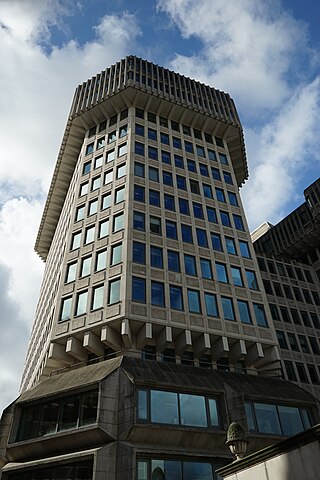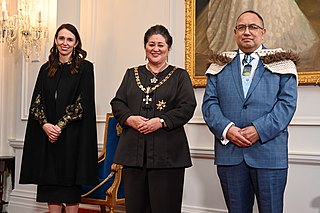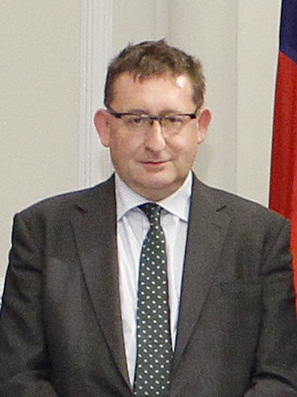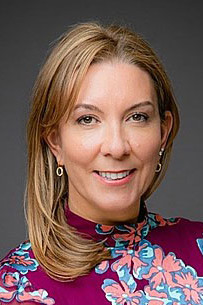Related Research Articles

The Secretary of State for the Northern Department was a position in the Cabinet of the government of Great Britain up to 1782. Then the Northern Department became the Foreign Office and the position evolved into the Foreign Secretary.

The Secretary of State for the Southern Department was a position in the cabinet of the government of the Kingdom of Great Britain up to 1782, when the Southern Department became the Home Office.

The usher of the Black Rod is an official in the parliaments of several countries of the Commonwealth of Nations. The title is often shortened to Black Rod, and in some countries, formally known as Gentleman Usher of the Black Rod or Lady Usher of the Black Rod. The position originates in the House of Lords in the Parliament of the United Kingdom. Equivalent positions exist in Australia, Canada and New Zealand.

The Lord Steward or Lord Steward of the Household is one of the three Great Officers of the Household of the British monarch. He is, by tradition, the first great officer of the Court and he takes precedence of all other officers of the household.

The Government Legal Department is the largest in-house legal organisation in the United Kingdom's Government Legal Profession.

The Board of Trade is a British government body concerned with commerce and industry, currently within the Department for Business and Trade. Its full title is The Lords of the Committee of the Privy Council appointed for the consideration of all matters relating to Trade and Foreign Plantations, but is commonly known as the Board of Trade, and formerly known as the Lords of Trade and Plantations or Lords of Trade, and it has been a committee of the Privy Council of the United Kingdom. The board has gone through several evolutions, beginning with extensive involvement in colonial matters in the 17th century, to powerful regulatory functions in the Victorian Era and early 20th century. It was virtually dormant in the last third of the 20th century. In 2017, it was revitalised as an advisory board headed by the International Trade Secretary who has nominally held the title of President of the Board of Trade, and who at present is the only privy counsellor of the board, the other members of the present board filling roles as advisors.

The Order of precedence in New Zealand is a guide to the relative seniority of constitutional office holders and certain others, to be followed, as appropriate at State and official functions. The previous order of precedence was revoked and Queen Elizabeth II approved the following Order of Precedence in New Zealand effective 20 September 2018:
- The Monarch of New Zealand.
- The Governor-General or, while acting in the place of the Governor-General, the officer administering the Government
- The Prime Minister
- The Speaker of the House of Representatives
- The Chief Justice
- The Dean of the Diplomatic Corps
- The Deputy Prime Minister
- Ministers of the Crown
- Former Governors-General
- Ambassadors and High Commissioners in New Zealand and Chargés d’Affaires accredited to New Zealand.
- The Leader of the Opposition in the House of Representatives
- Leaders, including co-leaders and joint leaders, of political parties represented in the House of Representatives, other than Ministers of the Crown.
- Members of the House of Representatives. There is no established order of precedence over members of parliament in general, although each party has its internal ranking.
- Judges of the Supreme Court of New Zealand, the Court of Appeal and the High Court of New Zealand.
- Former Prime Ministers, former Speakers of the House of Representatives, former Chief Justices, and members of the Privy Council.
- Mayors of territorial authorities and chairpersons of regional councils, while in their own cities, districts and regions. In 1989, boroughs and counties were amalgamated into district councils. District mayors, and the Chatham Islands mayor could expect to be accorded this same precedence.
- The Public Service Commissioner, Chief of Defence Force, Commissioner of Police, and Officers of Parliament .
- The Solicitor-General, Clerk of the House of Representatives, and Clerk of the Executive Council when attending a function involving the exercise of the position’s specific responsibilities.
- Chief executives of public service and non-public service departments.
- The Vice Chief of Defence Force, and Chiefs of Navy, Army and Air Force, and other statutory office holders.
- Consuls-General and Consuls of countries without diplomatic representation in New Zealand.
- Members of New Zealand and British orders, and holders of decorations and medals in accordance with the Order of Wear in New Zealand.
In the United Kingdom there are at least six Lords Commissioners of His Majesty's Treasury, serving as a commission for the ancient office of Treasurer of the Exchequer. The board consists of the First Lord of the Treasury, the Second Lord of the Treasury, and four or more junior lords acting as whips in the House of Commons to whom this title is usually applied.

The Clerk of the Parliaments is the chief clerk of the House of Lords in the Parliament of the United Kingdom. The position has existed since at least 1315, and duties include preparing the minutes of Lords proceedings, advising on proper parliamentary procedure and pronouncing royal assent. Many of the Clerk's duties are now fulfilled by his deputies and the Clerk of the Parliaments' Office.
The clerk of the House of Commons is the chief executive of the House of Commons in the Parliament of the United Kingdom, and before 1707 in the House of Commons of England.

The Clerk of the Crown in Chancery in Great Britain is a senior civil servant who is the head of the Crown Office.
The Clerk of the Privy Council is a senior civil servant in His Majesty's Government in the United Kingdom, being Head of the Privy Council Office.
Sir Michael Addison John Wheeler-Booth was a British public servant and Clerk of the Parliaments. He was educated at Leighton Park School, Reading, and Magdalen College, Oxford.

The First Lord of the Admiralty, or formally the Office of the First Lord of the Admiralty, was the political head of the English and later British Royal Navy. He was the government's senior adviser on all naval affairs, responsible for the direction and control of the Admiralty, and also of general administration of the Naval Service of the Kingdom of England, Great Britain in the 18th century, and then the United Kingdom, including the Royal Navy, the Royal Marines, and other services. It was one of the earliest known permanent government posts. Apart from being the political head of the Naval Service the post holder was simultaneously the pre-eminent member of the Board of Admiralty. The office of First Lord of the Admiralty existed from 1628 until it was abolished when the Admiralty, Air Ministry, Ministry of Defence and War Office were all merged to form the new Ministry of Defence in 1964. Its modern-day equivalent is the Secretary of State for Defence.
Sir David Stephens KCB CVO was a British public servant and Clerk of the Parliaments from 1963 to 1974. He was educated at Winchester College, Christ Church, Oxford and The Queen's College, Oxford.

Sir David Richard Beamish, is a British public servant who was the Clerk of the Parliaments, the chief clerk in the House of Lords, between 16 April 2011 and 15 April 2017.

During the early 17th century, England's relative naval power deteriorated; in the course of the rest of the 17th century, the office of the Admiralty and Marine Affairs steered the Navy's transition from a semi-amateur Navy Royal fighting in conjunction with private vessels into a fully professional institution, a Royal Navy. Its financial provisions were gradually regularised, it came to rely on dedicated warships only, and it developed a professional officer corps with a defined career structure, superseding an earlier mix of sailors and socially prominent former soldiers.

The Marine Department, originally called the Marine Office, was created in 1755 as a result of the formation of the Corps of the Royal Marines and was a department within the Admiralty. The department was a civilian secretariat responsible for corresponding with the various Royal Marine Divisions. It existed until 1809 when its functions were merged into the Marine Pay Department. The department was administered by the First Secretary of the Marine who was supported by a deputy the Second Secretary of the Marine.

The Counsel to the Navy Department, Ministry of Defence originally called Counsel to the Navy Board was an appointed legal adviser to the Royal Navy from 1673 to 1995.
The Legal Adviser to the Home Office is a senior government lawyer and the chief legal adviser to the Home Office. The office was formally established in 1933, but older offices with similar functions date back to the early nineteenth century.
References
- ↑ "No. 52373". The London Gazette . 1 August 1983. p. 10125.
- ↑ "No. 50551". The London Gazette (Supplement). 13 June 1986. p. 3.
- ↑ "No. 52373". The London Gazette . 24 December 1990. pp. 19676–19677.
- ↑ "No. 54982". The London Gazette . 18 December 1997. p. 14166.
- ↑ "Chris Sainty".
- ↑ "Henry Sainty, Partner". 25 October 2021.